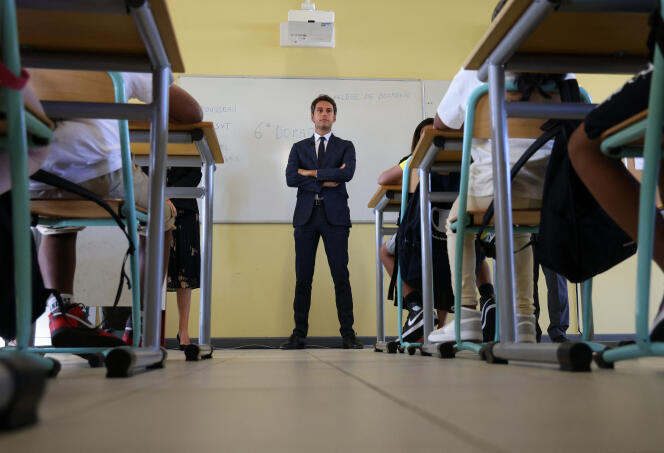
Gabriel Attal commanded: “strong measures” It will be announced at the beginning of December “level up” students. Among them, the Minister of National Education has raised several times the possibility of grouping students according to their level of mathematics and French. “When there are students of such different levels in the same class (…)you end up dragging everyone down”, he justified on November 8 in the Senate. The mission known as the “requirement of knowledge” launched at the beginning of October to prepare future measures and the results of which await, was therefore engaged.“rate” proposal
The management of heterogeneity, consistent with only one university since its creation in 1977, has been at the core of all reflections on this educational segment for almost fifty years. The idea of responding to this by acting in groups of levels, however, does not get the support of any teaching union, with the exception of Snalc. This minority union has been proposing an organization for more than ten years “modular” from the university from 5estudents, for mathematics and French, would be divided between groups “deepening” and, for students with difficulties, groups “basics”, benefiting from a reduction in the number of employees. The Minister, if he did not specify anything about the organization that could be foreseen in the college, has put the idea as an example on several occasions.
In this way, Gabriel Attal embarks on a borderline of the dangers that research has shown. “Managing heterogeneity by separating students according to level does not work and has harmful consequences: it increases inequality and, as international comparisons show, does not raise the overall level”says Dominique Lafontaine, emeritus professor of educational sciences at the University of Liège.
“Catastrophic Consequences”
The work done in grade classes has established the effect of “stigma” it led to a loss of self-esteem and motivation among students from weaker classes, thus affecting their academic performance. Likewise, in the face of a fragile group, teachers, who agree on the difficulty of managing homogeneous classes with a low level, showed a tendency to adjust the learning objectives downwards.
On the contrary, students who are in a good class gain more self-confidence and emulation, which benefits them, thus widening the gap with those who have the greatest difficulties, who are also the most disadvantaged in social situations. The results for good students, less sensitive to the composition of their class than for fragile ones, are not, however, ambiguous.
You have 63.43% of this article left to read. The rest is reserved for subscribers.

